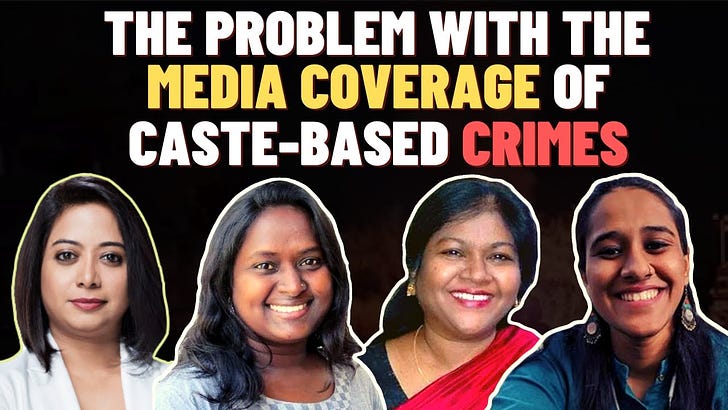Inclusion versus appropriation
From Gandhi to Arundhati Roy to Swara Bhaskar, the age old problem of upper caste appropriation of #DalitLivesMatter
We’ve seen something unusual in this last week. Something so big that it managed to shake even the hugely pro-government Indian news channels from their Sushant Singh Rajput ganja daze and forced them, briefly, to confront reality. The extraordinary tragedy of 19-year-old Manisha Valmiki’s brutal caste rape and murder, allegedly at the hands of four local Thakur men in the village of Hathras, seems to have done what seemed impossible even days ago. It has pierced a completely dead national conscience. The tragic end of her life, and the equally brutal thuggery with which the U.P government has treated her body, and her bereaved and grieving family has been impossible to ignore (well, except for the Honourable Prime Minister, who seems to have managed to ignore it just fine).
In the shadow of this tragedy, we were also finally given the opportunity to listen to a voice that is too often suppressed or “spoken for” - the voice of the Dalit woman. This fantastic panel discussion, for example, moderated by Faye D’Souza with Kiruba Munusamy (@kirubamunusamy) Divya Malhari (@Datlitwriter) and Cynthia Stephen (@cynstepin), provided insights impossible to find elsewhere.
On Friday however, we were back to business as usual, with pictures of the photogenic, articulate, popular, and yes, upper caste, Bollywood actress, Swara Bhasker, climbing on to a vehicle next to the charismatic Bhim Army chief Chandrashekhar Azad, solemnly holding a poster of Dr. B.R. Ambedkar dominating news of the protests at Jantar Mantar. While I don’t question Bhasker’s intentions, it was difficult to watch the Dalit female voice being (once again) sidelined.
It also raised an age old question- while her large twitter following (1.1M followers) and mostly woke fanbase unquestionably make her support useful to give a cause mainstream appeal, is there really no way to do that without taking away the spotlight? It’s something caste-Hindus have a historically abysmal record with.
Gandhi
It is true that the efficacy of Gandhi’s movements owe much to their generally inclusive nature. They were umbrella movements with a wide range of participants, including some hitherto excluded groups like women and Dalits. Participation, not exclusion was the focus, and this did lead to mainstream attention being focussed on causes that were at the time sidelined.
An unfortunate side-effect of this was that Gandhi tended to assume he spoke authoritatively on behalf of everyone. And perhaps the greatest sufferers of this tendency were the Dalit community, specifically in relation to the negotiations around the 1932 Poona Pact. Going into Gandhi’s writings first hand, as always, throws a little more light on this. The core of Gandhi’s most problematic belief can be summarised in this interview with the Chicago Tribune on September 23, 1932, where he remarks, with stunning arrogance,
You must not be startled with my presumption in claiming to know depressed interests more than [their] leaders. Though I am touchable by birth… I have become untouchable by choice.
While Gandhi’s views on separate electorates, especially when viewed in the context of the role separate electorates played in partition and the creation of Pakistan, are worthy of more detailed consideration, his claim to be the sole voice that could truly represent the depressed classes is, by all accounts, staggering. And what was more troubling, he brought the entire force of his methods to maintain this claim. His September 1932 fast was little short of blackmail, and targeted as it was against an already vulnerable community, it was a shocking breach of his own principles of non-violent action.
While the strength of Dr. Ambedkar’s leadership at least ensured the inclusion of reservations in parliament and public service, something Gandhi had strong initial objections to, Gandhi’s usurpation of the right to speak on behalf of the Dalits, which he backed with the full might of his stature, and which he continued with until his death in 1948, has not been forgotten, and is not easily forgiven.
Arundhati Roy
While Arundhati Roy, writing a book size introduction to the Annihilation of Caste in 2014 does bring to the spotlight many of Gandhi’s failings in his dealings with Dr. Ambedkar, she curiously does very little to introduce that great work or engage with the ideas contained in it. Ironically, she instead uses the opportunity as a platform to launch her own agenda- an intellectual attack on Gandhi.
Murali Shanmugavelan, writing in the Independent, accurately summarises the problems with Roy’s introduction, including the fact that it is extraordinarily monolithic and barely engages with the text of the Annihilation of Caste. He writes,
Her introduction, in fact, barely references the original text and mainly focuses on comparing Gandhi with Ambedkar, which seems to be the real purpose of the book. Roy, by her own admission, said at the launch at Columbia University that she had chosen not to publish her text as a stand-alone book, because she is…”pretty sure it would have been banned or disappeared in some ways. So it was a bit of a Trojan horse operation.”
It’s ultimately quite tragic that Roy chose to use Gandhi’s own methods of appropriating the mantle of leadership of a cause that was not his own to launch her own criticism of him.
Now I like Swara Bhasker. I do. I admire her grit and her courage in dealing with the hatred that is thrown her way. But in this case, by shining the spotlight on herself and not passing the mic to Dalit women she’s doing herself and this cause no favours. #DalitLivesMatter doesn’t need more upper caste saviours. It needs it’s upper-caste supporters to amplify the voices that have been silenced for far far too long. It needs it’s upper caste supporters to amplify and really really listen to Dalit women.



